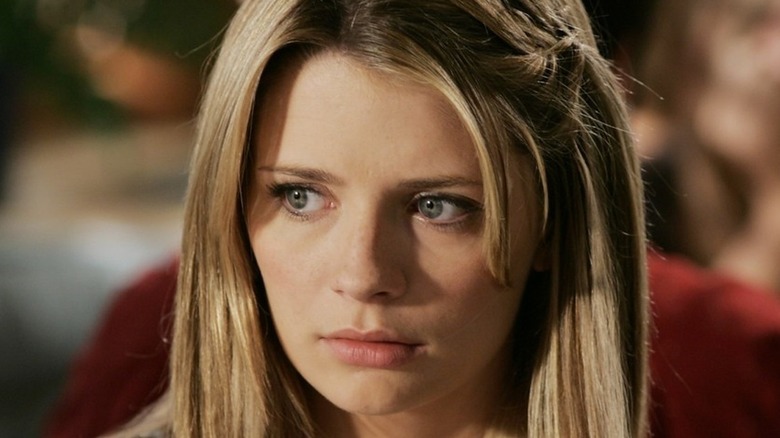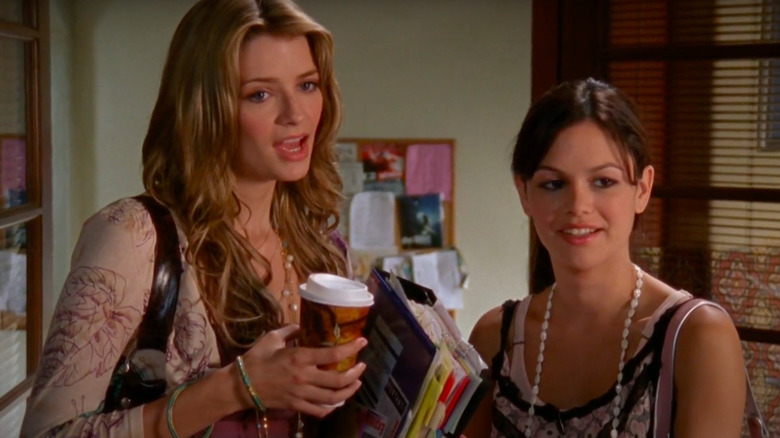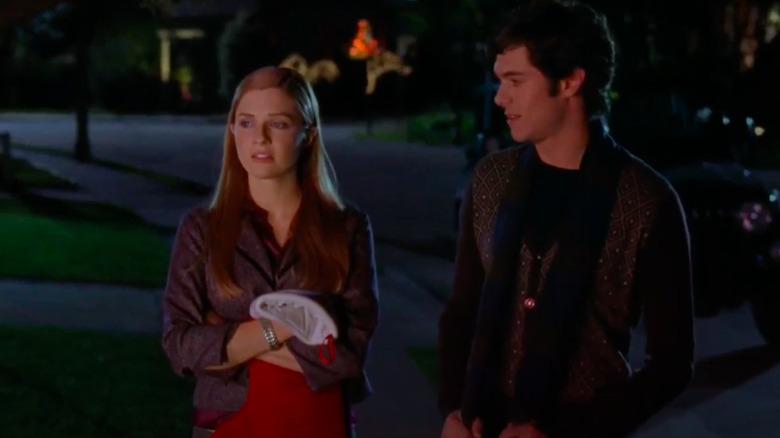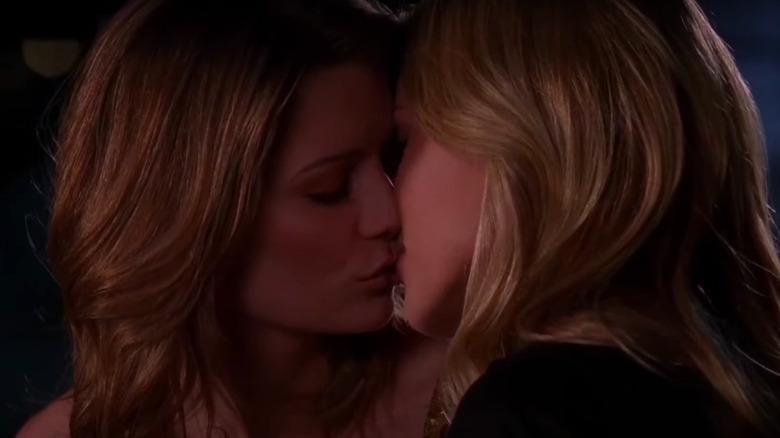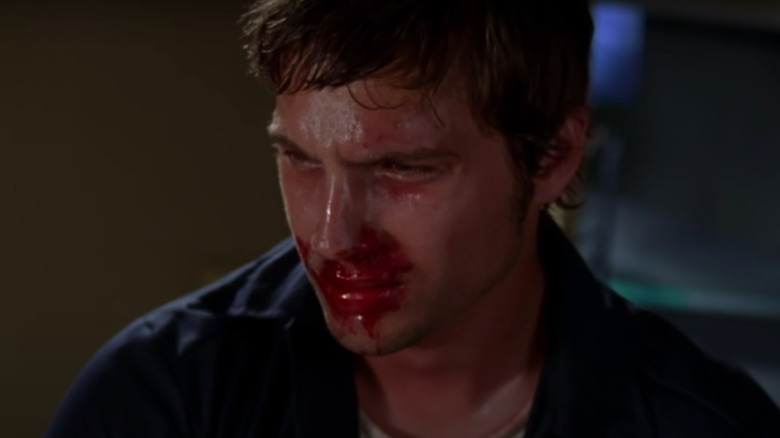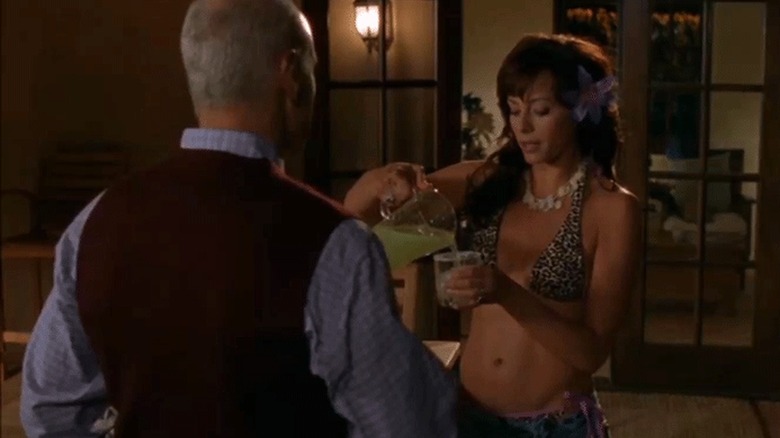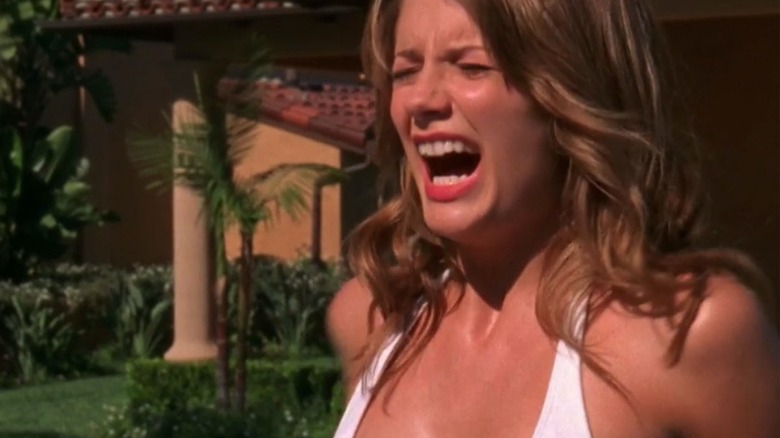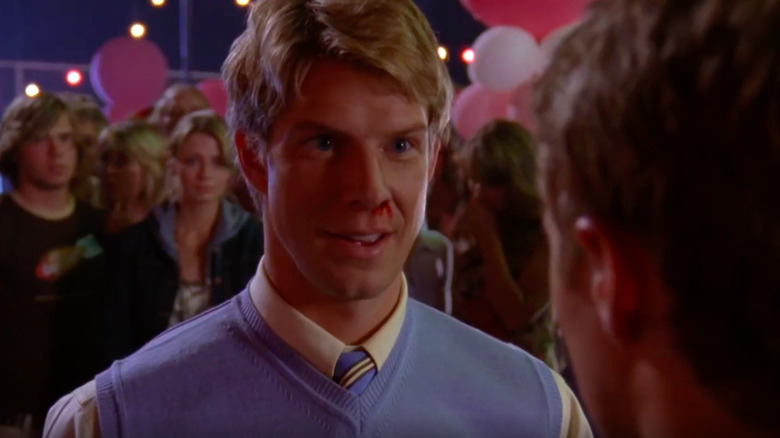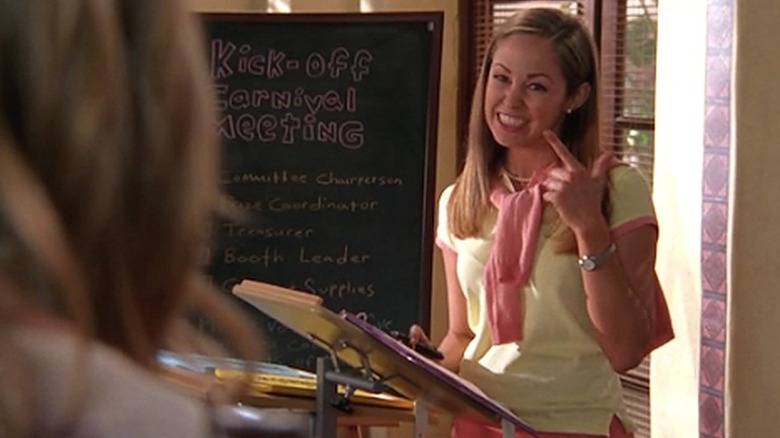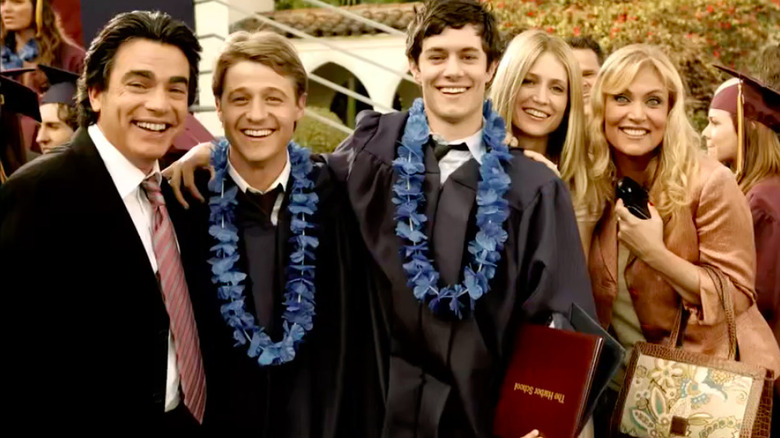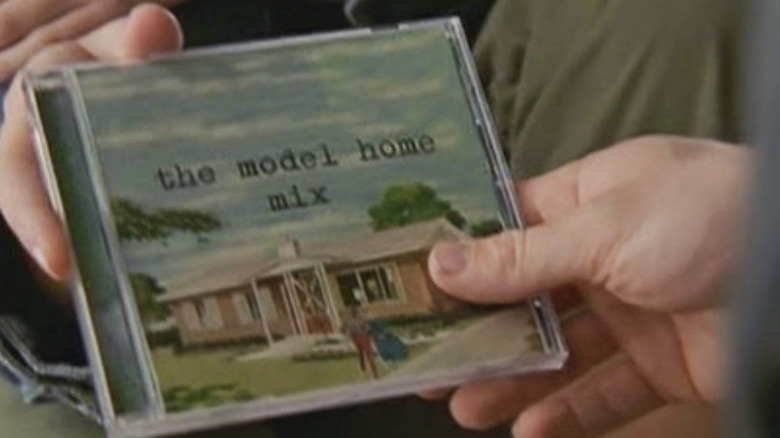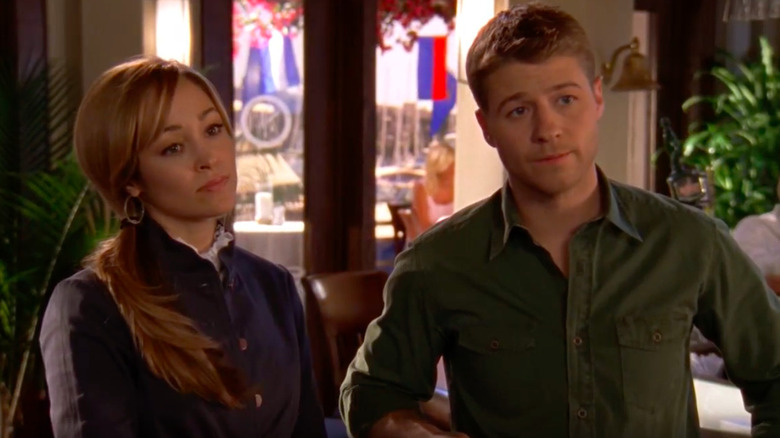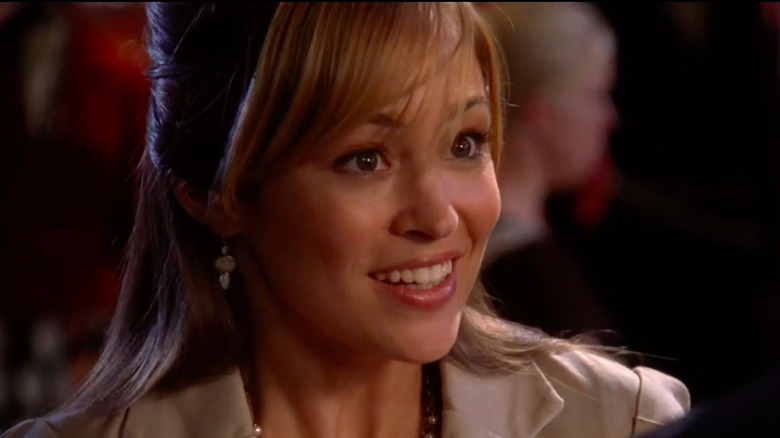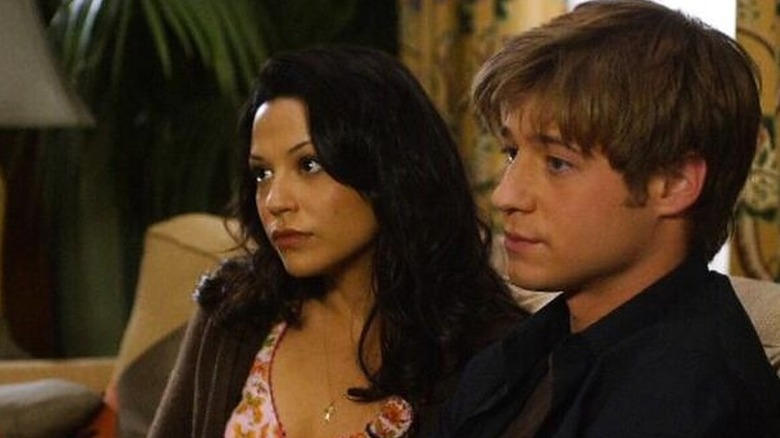Questionable Things We Ignored In The O.C.
Despite airing over 15 years ago, "The O.C." is still one of the most impactful shows on pop culture of all time. While it only lasted four seasons, "The O.C." irrevocably changed TV the way we knew it. As a defining show in the early aughts, much of what shows do these days musically debuted on "The O.C." — both in terms of having music be its own character and debuting a slew of new songs from bands like Coldplay. "The O.C." was as much of a zeitgeist in the music scene as the actual zeitgeist, and the show's impact on music and its help making Indie music mainstream hasn't waned since.
Though with all of the incredible ways the show defined a generation, there are still plenty of things the series could have done better. The characters are far from flawless, which is a part of their charm, but like "Gossip Girl," the series often gets criticized for glorifying wealth (as much as Sandy and Seth Cohen reject the politics and snooty vibe of their neighbors). Between a cringe amount of slut-shaming, undertones of homophobia, and stigmatizing therapy, the show is very much a product of its time — but that's no excuse. Did you question any of the following plotlines when they aired in the early '00s?
Constant slut-shaming from other women
Sure, there are a lot of feminist vibes on "The O.C." for its time, like the support that Theresa receives from the other women when she's contemplating an abortion. Stories like those simply weren't all that common in 2003. However, the show's treatment toward any women that the main characters don't like is abysmal. The biggest culprit? Summer and Marissa's constant slut-shaming of other women.
Almost every episode of the show's first few seasons witnesses Summer or Marissa calling another woman a "slut" or a "skank." Any time either of the leading ladies has an issue with other women, they whip out those derogatory comments despite being all about girl power. On the one hand, their friendship with each other is mostly drama-free, and there's rarely that competitive or backstabbing component you often see with teenage girls on shows. However, the slut-shaming is ever-present, and they never really move past it or acknowledge that, hey, maybe it's not cool to call any woman you don't like a "skank." Additionally, both characters are sexually active and sex-positive, so their demeaning language surrounding other women is confusing and hypocritical — and often comes out of possessiveness toward their boyfriend of the week.
Casual incest undertones
Why are so many shows hell-bent on going in an uncomfortable incest direction at least once during a series? For a time period, such as the aughts, that typically treated LGBTQ+ characters like garbage (if they even included them at all), some series, such as "The O.C.," were far too chill about casual incest.
Before we get the revelation that Lindsay is Caleb's biological daughter (and Seth's aunt), Seth calls her his "dream woman" and asks Ryan to set them up. At this point, the show already placed small nuggets that Caleb was paying off a woman for a reason he was willing to go to jail for, so it's not like this moment came before they decided on this arc. Given how overwhelmingly awkward Seth and Lindsay act on their date, it was meant to go nowhere because they are related.
Given that the date ultimately goes nowhere and the writers clearly planned this arc ahead of time, its inclusion is baffling at best. No one needed to see Seth lust after his aunt — and no one is near as horrified by this as they should be. Therapy? Anyone? Please?
The show treats LGBTQ+ storylines awfully
Speaking of awful LGBTQ+ representation, "The O.C." is certainly guilty of treating its queer characters as sexed-up objects or comedic plot devices. To its minor credit, the series has more queer characters than most shows in the early aughts, but if they weren't going to handle them properly, what's the point?
When Seth has Ryan spy on Alex when she's meeting her ex, Ryan finds out that her ex is a woman. Instead of pretending like he didn't see anything, Ryan outs her as bisexual to Seth instead of letting Alex tell him when she's ready. Predictably, Seth has a meltdown. He can't accept it at all, but he's more than happy to sexualize Alex's short-lived relationship with Marissa that develops after Alex and Seth break up. These characters clearly only exist to further the plots of their straight counterparts, and it's not even subtle.
Other cringe LGBTQ+ moments in the show include Kaitlin saying, "Gay dad trumps slutty mom," when she's comparing her teenage angst woes with Luke's younger siblings. Later, Kaitlin intentionally outs a classmate to get back at the popular girl, and no one calls her out on it. It's played off like she's doing him a favor, which is a wholly toxic message to have for a teen audience. Imagine over a million teenagers now thinking that outing their classmates will help them accept themselves. It's not a great look.
That's not how the law works, Trey
Trey Atwood is certainly no peach. We start the series with Ryan's older brother coercing him to steal a car with him, spiraling Ryan's legal troubles and almost landing him in jail. Trey doesn't get off so easily, spending a significant amount of time in prison, yet that doesn't stop him from continuing his quest to be The Actual Worst.
In Season 2, our loving brother gets out of prison and decides to, once again, drag Ryan down with him. At the height of his drug-fueled arc, he attempts to rape Marissa — the only person who's shown him any genuine kindness. Instead of leaving town, he haunts Marissa outside of her school, intimidating her into keeping what happened from Ryan. Of course, Ryan finds out and confronts Trey. So, what does he do? Try to strangle his brother to death when Ryan confronts him, obviously.
After Marissa shoots Trey to save Ryan's life, his attempted rape comes out along with the attempted murder of his brother. Yet even with that revelation, no one seems interested in charging him after he wakes up from a coma. Sorry, waking up from a coma doesn't absolve you of your crimes, and Trey is able to slip away with zero pursuit. The only good thing to come from this arc is the fact that the dramatic use of Imogen Heap's "Hide and Seek" when Marissa shoots Trey — which inspired the viral "Dear Sister" skit by "Saturday Night Live." Mmmm, whatcha say about that?
If you or anyone you know has been a victim of sexual assault, help is available. Visit the Rape, Abuse & Incest National Network website or contact RAINN's National Helpline at 1-800-656-HOPE (4673).
Julie almost poisoned Cal
Julie is certainly not the most moral character in the series — she hooks up with her daughter's 18-year-old ex, who's still in high school. Yet her selfishness and thirst for wealth come to a shocking head in Season 2 when she almost murders her husband.
In a blink-and-you'll miss it scene, Julie attempts to poison Caleb before he can divorce her. They both know the divorce is imminent, but she only gets a payout if the marriage lasts a year — which will occur the next day. To avoid losing the lavish lifestyle he bestowed on her, Julie hands him the poisoned drink — which Julie very subtly doused. Ultimately, she's unable to go through with it, knocking it out of his hands and remaking a clean glass. Because Caleb has a heart attack and dies in the pool anyway, we gloss past this so fast that it's easy to forget just how truly morally depraved Julie can be.
Marissa demonizes the concept of therapy
The very thought of Marissa going to therapy sends her off the deep end every time it's mentioned. Between an accidental overdose, alcohol problems, severe mood swings, traumatic family dynamics, and debilitating depression, no one in the show could use it more than her — which is nothing to be ashamed of.
The series heavily implies that Marissa has some kind of mood disorder that she should get help managing with therapy and medicine if needed. It's no secret to anyone who knows her, but her parents consistently allow Marissa to call the shots because it's easier than actually parenting her. Even after her overdose, her parents don't push the subject nearly enough or set proper boundaries — not even after her later issues. Had they forced the issue, Marissa might still be alive.
Given what many teenagers go through in middle school and high school, this isn't exactly a great message to send out. To make matters worse, when Summer goes to therapy to deal with Marissa's death, it's treated as a joke regarding the seven stages of grief. That moment could have undone some of the previous damage, but the writers dropped the ball.
If you or anyone you know is struggling with addiction issues, help is available. Visit the Substance Abuse and Mental Health Services Administration website or contact SAMHSA's National Helpline at 1-800-662-HELP (4357). If you or someone you know is struggling with mental health, please contact the Crisis Text Line by texting HOME to 741741, call the National Alliance on Mental Illness helpline at 1-800-950-NAMI (6264), or visit the National Institute of Mental Health website.
The Harbor Dean manhandles Marissa
Despite his obsessive and toxic views on punishment, it takes blackmailing the Dean of Discipline about his affair with Taylor to get him out of the school — but he should have been gone long before that. Dean Hess physically and quite violently shoves Marissa at the carnival, roughly dragging her away from the grounds. He does it in front of over a dozen witnesses, and no one does anything, but in reality, you can't just manhandle underaged students. Ryan had every right to get physical with him when the Dean wouldn't leave her alone.
The Dean's hypocrisy is infuriating to watch. Yet despite being the head of discipline, he's far worse than any of the students he scolds. It's baffling that Marissa gets kicked out of the school in the first place for saving the life of a classmate, but we also brush past his inappropriate behavior with Taylor. No one bothers to have a discussion with Taylor, either, about inappropriate boundaries that an educator shouldn't cross — and she spends the rest of the series waxing poetic about how good he is in bed.
Taylor's intro to the series makes no sense
What's the deal with Taylor coming onto "The O.C." out of nowhere, anyway? In Season 3, Taylor is introduced as Marissa's long-time rival. Not only do we never see her before Season 3, but she's never even mentioned. It's not really believable that at a small private school like Harbor, an antagonist that's as built up as Taylor would be MIA for the entire series.
If she was vying for Marissa's leadership role at the school, Taylor would have been at all of the Harbor events we've seen up until that point. It's not exactly a secret that the writers inserted as a long game (and poor) replacement for Marissa in her final season, but Taylor's backstory is clumsy at best. To avoid all of the questions surrounding her introductions, they could have just made her a new student vying to upturn Marissa's legacy as Harbor's It Girl. Salt on the wound, Josh Schwartz. Salt on the wound.
The Cohens never formally adopt Ryan
Even by the first few episodes, it's clear that Ryan is a son in the Cohens' eyes — they even say it on more than one occasion. Ryan even calls Sandy 'Dad' when he feels threatened by Ryan's biological dad showing up out of the blue. So why do they never actually adopt him?
Given how often Ryan's trouble-finding habit puts their guardianship over him at risk, a formal adoption would have solidified his place in the Cohen house much more securely if they pulled the trigger on an actual adoption. We're never given a reason for this, nor do Sandy and Kirsten ever even have a conversation with Ryan about it.
While Ryan knows he always has a place with the Cohen's, he doubts his spot in the family any time he gets into trouble. To Ryan's credit, he does try to curb his punch-first-ask-questions-later habit, but all of that flies out of the window when someone needs saving — which happens more than you might expect in Newport Beach. Had the Cohens adopted Ryan, that fear of having his life ripped out from under him would dissipate.
Marissa's model home flashbacks make no sense
When Marissa finds herself in the newly rebuilt model home while hanging out with Volchok, she has flashbacks of the fire that almost killed Ryan — but she wasn't there. Back in Season 1, Ryan and Marissa's first significant moment happens at Kirsten's model home that Ryan crashes to avoid going to a group home. Of course, her overprotective boyfriend Luke followed her to the house, but he only confronts Ryan about his "territory" until after Marissa leaves. His scuffle with Ryan knocks the candles over and lights the house on fire, but at this point, Marissa is back in her room crying.
Fast-forward to Season 3, when she's having vivid memories of hanging out with Ryan at the model home. Her memories briefly flash to Ryan's fight with Luke and the flames beginning — both of which she was already gone for. The moment is meant to wind up to her death, getting fans nostalgic for the beginning of their relationship, but it makes no sense. Additionally, the two seconds of the fire she falsely recalls don't add to the impact of the memory at all. Her budding moments with Ryan and giving him a mix CD called "the model home mix" are far more impactful.
Ryan also somehow has the model home CD she made him with the original cover art after her death, even more confusingly. In Season 3, he makes it a point to say that he wished he still had the original — that burned. Continuity, what continuity?
Taylor is a toxic nightmare
Shortly after Marissa's death, Taylor begins aggressively pursuing Ryan even when he flat-out tells her that he's not ready to start dating. Instead of accepting friendship, she begins inserting herself in the most vulnerable aspects of his life to manipulate him into falling for her.
She tries to be his sleep therapist to seduce Ryan, among her other desperate and invasive ploys to spark his interest in her. Then, she flat-out lies to him when he asks if she likes him and immediately tries to massage him after, playing it off as platonic. Even Sandy roots for Ryan and Taylor despite her glaring red flags.
Despite Ryan's candid honesty that he's not ready to date, Taylor flips out at him for rejecting her even though she knows that he just watched the love of his life die in his arms. There's selfish, and then there's Taylor Townsend. She pulls this same creepy behavior toward Seth earlier in the series, where she forces herself on him and tries to break him up with Summer. This girl needs a PowerPoint presentation that no is a complete sentence.
If you or someone you know is dealing with domestic abuse, you can call the National Domestic Violence Hotline at 1−800−799−7233. You can also find more information, resources, and support at their website.
The show glorifies stalking
Sadly, Taylor gets even worse through her desperate ploy to win over Ryan. Taylor isn't oblivious to her stalker tendencies, either — yet she does little to nothing to curb this behavior. Because Taylor is a quirky woman, the behavior plays out as harmless and desperate — and not insidiously horrifying like it actually is. The most uncomfortable aspect of Taylor's stalking is that she plans it out ahead of time. We see her hiding with binoculars outside of Ryan's workplace until she's physically dragged off the premises by security. This is not a woman who should be dating anyone before some serious therapy.
Yet, once again, when she does see a therapist after acknowledging her stalking tendencies, she eventually blows her off. Both Ryan and Taylor acknowledge that she has a stalking problem, but we're supposed to laugh when she follows him around, snoops in his belongings, and manipulates him into dating her.
To get her to date him and ditch her therapist, Ryan breathes into the phone like Darth Vader as a joke to get her to accept her stalker tendencies because he likes her anyway. There are not enough yikes in the world. If she were a male character, there would be a riot over this behavior. In fact, one of the show's most-hated characters is Oliver — who is the male equivalent of Taylor. Now, Taylor has never pulled a gun on someone for not liking them, but frankly, it's not beyond reason at this point.
Who is Theresa's baby daddy?
One of the most significant plot holes left in the show is the identity of Theresa's son. The question of whether or not he's Ryan's son is played out all through the series, and though she claims he's Eddie's, the kid looks nothing like him. If we're being honest with ourselves, he looks like a mini Ryan. Of course, Ryan's chivalrous savior complex prompts him to ditch Newport and move back to Chino with Theresa the minute he discovers her pregnancy — that might not even be his. Yet, he's willing to give up his life to help her raise the kid anyway.
However, Theresa can see that he's unhappy and decides to lie to him, telling him that she lost the baby so he would go back to Newport and live his life. So what's stopping her from lying about the kid's father years later when he discovers that she did have the baby? DNA test or bust, but we never get any kind of real closure on this. It's also pretty weird that Ryan never found out that she actually had the baby for two years. They ran in the same Chino circles, after all. Despite him living in Newport, that kind of thing would definitely get back to him. It's entirely possible that Theresa's son is Ryan's, and it's equally likely that the kid that Ryan offers to help in the epilogue is Theresa's (and his). Their similar appearance is uncanny.
